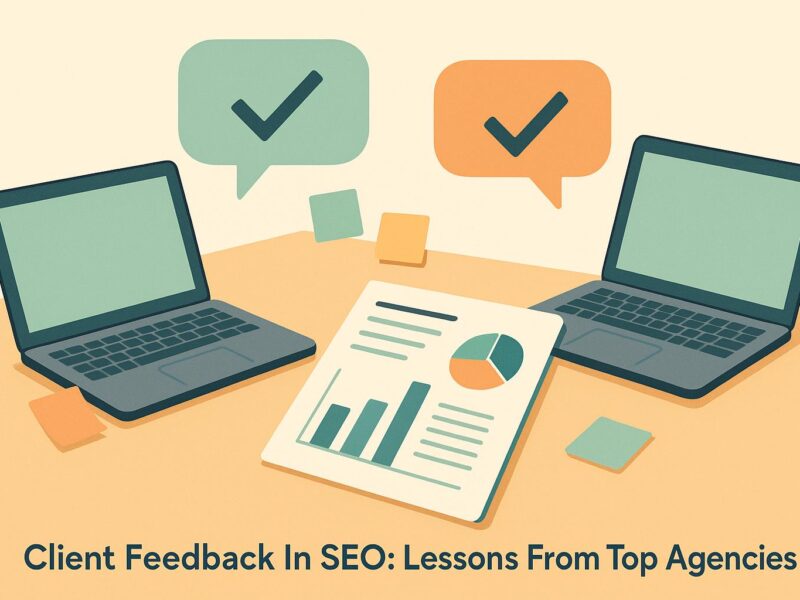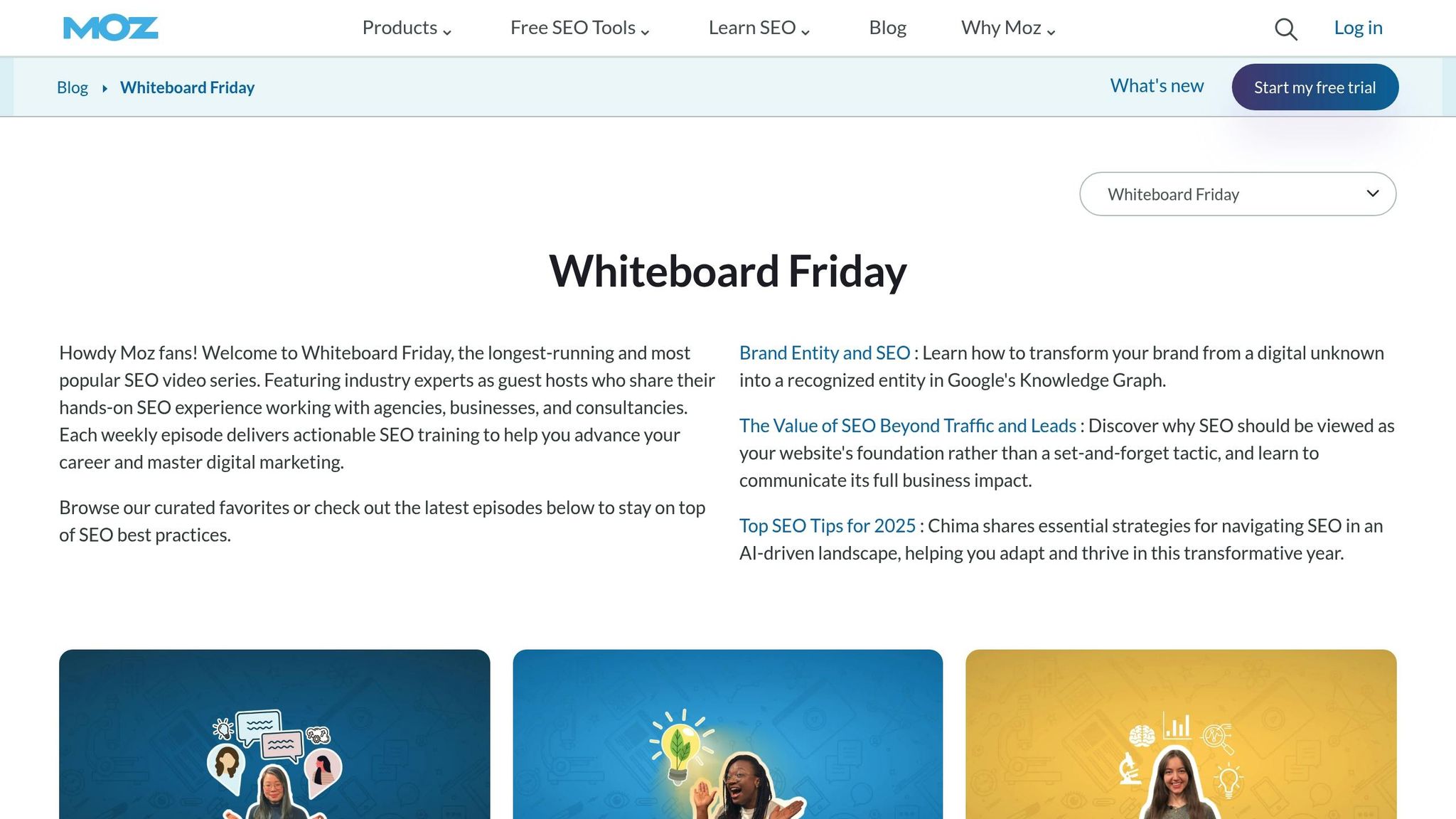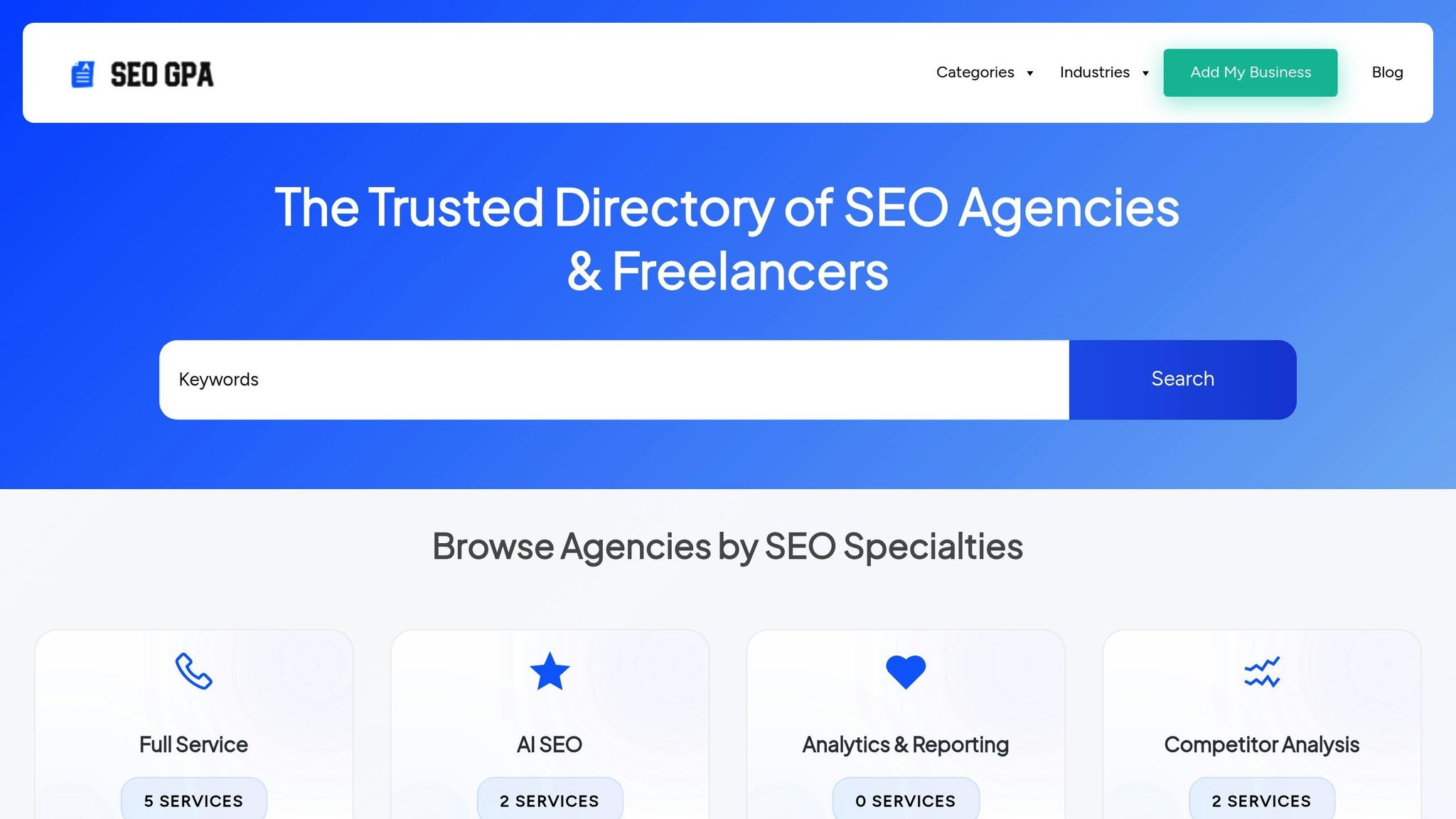
Client feedback is a game-changer for SEO agencies. It helps improve services, strengthen client relationships, and ensure strategies stay effective in a fast-changing digital landscape. Top agencies actively gather feedback through surveys, direct conversations, and performance tracking. They don’t just listen – they act on it, creating visible changes that clients value.
Key takeaways:
- Why it matters: Feedback builds trust, prevents small issues from escalating, and helps deliver tailored solutions.
- How it’s collected: Surveys, check-ins, and analytics help agencies understand client needs.
- Turning feedback into action: Agencies prioritize, organize, and implement changes based on client input.
- Best practices: Clear communication, personalized strategies, and regular updates keep clients engaged and satisfied.
Platforms like SEO GPA make it easier to find agencies that excel in feedback-driven service. The bottom line? Agencies that listen and adapt to client input don’t just deliver better results – they build lasting partnerships.
Aligning SEO Strategy with Client Business Goals – Whiteboard Friday

How SEO Agencies Gather Client Feedback
Client feedback plays a key role in shaping how SEO agencies operate. To ensure they truly understand their clients’ needs, top agencies use a mix of strategies designed to capture insights from diverse perspectives.
Survey Tools and Feedback Forms
Structured surveys and feedback forms are a go-to method for collecting client input. Agencies often send out email surveys at specific project milestones, gathering feedback that helps them refine their processes and services.
To make surveys effective, agencies customize questions based on the client’s industry and goals. For example, they might ask about local search performance or the effectiveness of conversion strategies. Feedback forms embedded in client portals are another popular tool, allowing clients to share their thoughts in real time. These forms often include rating scales and open-ended questions, making it easier for clients to provide detailed responses.
Some agencies take it a step further by deploying feedback forms immediately after meetings or presentations. This approach captures impressions while discussions are still fresh, leading to more candid and actionable responses.
Direct Communication Methods
Surveys are great, but they can’t capture everything. That’s why many agencies prioritize direct conversations to gather deeper insights. Regular check-in calls that focus solely on feedback – not strategy – create a space where clients feel comfortable sharing concerns or suggestions.
Phone calls are particularly effective for uncovering details clients might hesitate to put in writing. Agencies also use live chat features on their websites or client portals for quick questions or clarifications. For more complex discussions, video calls with screen sharing allow clients to address specific issues while reviewing reports together.
Analytics and Performance Tracking
Technology also plays a big role in gathering feedback. By analyzing behavioral data from client portals, agencies can see which sections of reports clients engage with the most – and which they skip. Metrics like login frequency and page views help agencies identify clients who might need extra support.
Email analytics and portal activity tracking can also highlight when client satisfaction dips, whether it’s due to campaign adjustments or market changes. Some clients prefer detailed updates, while others want quick summaries, and tracking this behavior helps agencies tailor their communication style.
The most effective agencies don’t rely on just one method. By combining surveys, analytics, and direct conversations, they build a well-rounded understanding of what their clients value. This integrated approach allows them to refine strategies, address concerns, and consistently deliver better service.
Converting Feedback Into Action
Gathering client feedback is just the first step. The real challenge lies in turning those insights into actionable changes that improve SEO outcomes and strengthen client relationships. Once feedback is collected, the next step is ensuring it translates into meaningful action.
Building a Complete Feedback Loop
The best agencies don’t just listen to feedback – they act on it in a way that clients can see and appreciate. They use closed-loop systems, which connect client input to visible service changes. Here’s how it works: feedback is acknowledged within 24–48 hours, issues are documented, team members are assigned to address them, and clients are provided with a clear timeline and proof of results.
For example, if a client requests better reporting, the agency doesn’t just tweak the format. They review the changes directly with the client to ensure it meets their needs. This kind of proactive approach builds trust and encourages clients to keep sharing their thoughts.
Some agencies go a step further by creating feedback tracking dashboards. These dashboards allow clients to see how their suggestions have influenced changes over time, reinforcing the idea that their input is valued and actively shapes the partnership.
By systematically integrating feedback, agencies can prioritize it for maximum impact.
Organizing Feedback by Priority
Not all feedback is created equal, and successful agencies know how to prioritize. Feedback is often categorized based on its urgency and potential impact:
- High-priority issues: These directly affect performance and demand immediate attention from senior team members.
- Medium-priority suggestions: These are addressed within a week or two.
- Low-priority ideas: These are bundled and reviewed periodically.
Recurring feedback from multiple clients automatically escalates its priority. For instance, if three or more clients request more frequent competitor analysis or a specific report format, that feedback moves to the top of the list, even if the individual impact seems minor.
Analyzing patterns across clients helps agencies identify broader trends and focus on changes that benefit multiple accounts.
Examples of Feedback-Driven Changes
Feedback often leads to tangible improvements in service quality, such as better reporting, tailored strategies, and expanded offerings. Here are some real-world examples of how agencies have turned client input into action:
- Improved Reporting and Communication: Many agencies have redesigned their reporting systems after clients expressed confusion over metrics or requested more actionable insights. Some switched from static monthly PDF reports to interactive dashboards that clients can access anytime. Others added video walkthroughs to explain complex data in plain terms.
- Customized Strategies: Feedback is often the key to fine-tuning strategies for specific industries. For example, e-commerce clients might highlight the importance of seasonal trends or product launches, prompting agencies to adjust their approach. Similarly, local businesses may request more targeted geographic strategies or community-focused content.
- Service Expansion: Clients frequently ask for support beyond traditional SEO. In response, agencies have added services like content marketing, social media management, or paid advertising. These integrated digital marketing offerings often end up being more profitable than the original SEO contracts.
The secret to successfully implementing feedback lies in transparency and follow-through. Leading agencies don’t just make changes – they explain the reasoning behind those changes and track the results to ensure they deliver real benefits. By taking this systematic approach, agencies turn client feedback into a competitive edge, driving satisfaction and long-term growth.
sbb-itb-36e0c40
Best Practices for Client Feedback in SEO
Top-performing SEO agencies know that actionable client feedback is the cornerstone of creating meaningful, tailored experiences. By focusing on what truly matters to their clients, these agencies set themselves apart, improving both client satisfaction and retention.
Customized Client Experiences
No two clients are alike – each comes with distinct goals, challenges, and communication styles. The best agencies take client feedback seriously to craft personalized strategies that go beyond cookie-cutter solutions.
For instance, a local restaurant chain might aim to boost location-specific rankings and drive more foot traffic, while a SaaS company could prioritize generating high-quality leads and improving conversion rates. By understanding these unique priorities, agencies can fine-tune their strategies, reporting methods, and communication to align with what each client values most.
Communication preferences also play a big role in personalization. Some clients thrive on detailed technical breakdowns, while others prefer quick, high-level summaries. Similarly, some might appreciate frequent updates, while others are content with occasional check-ins. Leading agencies document these preferences in detailed client profiles, covering everything from preferred communication frequency to industry-specific concerns. These profiles are updated regularly based on ongoing feedback, ensuring every team member is equipped to engage effectively.
This level of personalization fosters trust and ensures clients feel heard, laying the groundwork for clear and transparent communication.
Clear Communication and Updates
Transparency is key to building trust, and trust encourages clients to share honest feedback. The best agencies make it clear how client input directly shapes their services.
When issues arise, they respond quickly with a clear plan of action, outlining the steps they’ll take and the timeline for resolving concerns. Many agencies also use feedback tracking systems that allow clients to see how their input is being implemented. This not only keeps clients informed but also reinforces their confidence in the agency’s commitment.
Regular updates are another essential piece of the puzzle. Instead of waiting for formal reports, successful agencies share progress as it happens. For example, if a client suggests a new reporting format, the agency might send an email explaining how they’ve adjusted their reports and include early results from the change.
Proactive communication is equally important. By monitoring performance closely and addressing potential issues before they escalate, agencies demonstrate their dedication to client success. This approach not only solves problems quickly but also shows clients that their agency is invested in their long-term growth.
But clear communication is just one part of the equation. Consistent, proactive feedback collection is just as crucial.
Regular Feedback Collection
Gathering feedback once a year or through occasional surveys isn’t enough. The best agencies integrate feedback into their day-to-day operations, making it a natural and ongoing part of the client relationship.
This involves combining informal observations with regular, focused surveys. For example, a casual comment during a meeting – such as a client mentioning they need simpler data interpretation – can spark immediate service improvements. Agencies encourage their teams to actively listen for these cues during everyday interactions.
Structured feedback collection is most effective when it’s frequent and targeted. Instead of overwhelming clients with lengthy surveys, successful agencies ask concise, specific questions tied to recent deliverables. For example, after presenting a strategy or delivering a report, they might ask for quick feedback on its clarity and usefulness.
The goal is to make the feedback process easy and engaging, so clients feel comfortable sharing their thoughts.
When businesses are scouting for SEO agencies, platforms like SEO GPA can help. These platforms highlight agencies that prioritize client feedback and maintain transparent communication. Detailed profiles and client reviews on SEO GPA make it easier for businesses to find providers with a proven track record of listening and adapting.
Agencies that excel in these feedback practices don’t just retain clients – they turn them into loyal advocates who bring in referrals and contribute to compelling case studies that fuel future growth.
Using Feedback for Competitive Edge
In today’s fast-paced SEO landscape, agencies that actively listen to their clients and act on their feedback often gain an edge over the competition. The most effective agencies realize that feedback isn’t just about addressing issues – it’s a chance to refine their services and stay ahead in the game.
Improving Service Quality Through Feedback
Client feedback is a powerful tool for maintaining high service standards. It helps agencies identify and address potential gaps before they escalate. When clients highlight pain points or share ideas for improvement, savvy agencies use this input to fine-tune their overall strategies.
Take technical SEO, for example. Feedback can lead to simplified recommendations or clearer documentation, benefiting all clients. Similarly, insights from clients about their audience can shape content optimization strategies. For instance, if a client mentions that certain content formats or topics generate better engagement, agencies can adapt their approach to reflect these preferences.
Reporting and analytics also see significant improvements through client input. Clients may request specific metrics, alternative visualization styles, or different reporting frequencies to meet their internal needs. Agencies that adapt their reporting systems based on this feedback deliver more useful and client-friendly analytics.
Treating feedback as market research is key. When multiple clients raise similar concerns or make similar suggestions, it often points to broader trends or service gaps. Addressing these proactively not only enhances service quality but also strengthens client relationships.
Building Long-Term Client Relationships
Acting on client feedback isn’t just about improving services – it’s about building lasting partnerships. Agencies that consistently respond to feedback cultivate trust, which becomes a powerful competitive advantage.
Trust grows through consistent actions. When clients see their suggestions implemented, it reinforces their confidence in the agency’s commitment. This trust often leads to longer contracts, higher retention rates, and opportunities to expand services.
Satisfied clients also become advocates, promoting the agency through referrals, case studies, and testimonials. These organic endorsements carry more weight than traditional advertising because they’re rooted in genuine experiences.
Long-term relationships also open the door to valuable market insights. Clients who trust their agency are more likely to share strategic information, upcoming challenges, and industry trends. This insider knowledge allows agencies to anticipate needs and develop solutions before competitors can react.
From a financial perspective, retaining clients is far more cost-effective than acquiring new ones. Plus, as relationships mature, they often become more profitable, with streamlined processes and deeper mutual understanding.
By committing to feedback, agencies create a track record that platforms like SEO GPA showcase to help businesses find reliable partners.
The Role of SEO GPA in Feedback-Based Selection

SEO GPA plays a vital role in highlighting agencies that prioritize client feedback. The platform features detailed profiles and verified client reviews, making it easier for businesses to identify agencies that are committed to continuous improvement. Its review system specifically captures how agencies handle feedback, implement changes, and adapt their services over time.
The platform’s performance analytics spotlight agencies with consistently high client satisfaction scores, showcasing their ability to act on feedback effectively. Businesses can also filter results based on industry experience and service specialization, ensuring they find agencies with proven expertise in their specific market.
For agencies, maintaining a strong profile on SEO GPA is a competitive advantage. Positive reviews that mention responsiveness to feedback, clear communication, and service enhancements signal to potential clients that the agency values collaboration over simple transactions.
The platform’s categorization by service type and business size further helps businesses find agencies with experience serving similar organizations. This increases the likelihood of successful partnerships where feedback is naturally integrated into the working relationship.
Ultimately, agencies that excel at leveraging client feedback don’t just survive – they thrive. They build sustainable advantages, delivering lasting value for both their clients and their own growth over time.
Conclusion: Client Feedback Drives SEO Success
Client feedback plays a crucial role in shaping effective and sustainable SEO strategies. Agencies that actively listen to their clients and incorporate their insights tend to achieve better results, foster stronger relationships, and maintain a competitive edge.
The best agencies don’t just see feedback as a formality – they treat it as valuable intelligence. By leveraging client input to refine technical workflows, improve reporting, and adapt strategies to meet changing needs, they transform projects into trust-filled, long-term partnerships.
For businesses seeking SEO partners, it’s essential to prioritize agencies that genuinely value client feedback. Look for those with established systems to gather insights, clear processes for implementing changes, and a track record of being responsive. These agencies don’t view feedback as criticism but as an opportunity to improve and excel.
Platforms like SEO GPA make this selection process easier by offering detailed agency profiles, verified client reviews, and performance analytics. While feedback is just one piece of the puzzle, these tools provide a window into an agency’s dedication to service quality and ongoing improvement.
Agencies that embrace client feedback understand its power – it reveals opportunities and provides the market insights needed to stay ahead. When businesses collaborate with such agencies, they don’t just achieve better SEO outcomes – they gain partners committed to their long-term growth.
FAQs
How do leading SEO agencies turn client feedback into meaningful improvements?
Top SEO agencies know how to turn client feedback into meaningful action. They focus on listening carefully and use structured methods like regular surveys, performance reviews, or straightforward conversations to truly understand what their clients want and need.
When issues arise, these agencies act quickly to address them and adjust their strategies. This responsiveness shows they’re dedicated to achieving results that match their clients’ objectives. It’s not just about improving service quality – it’s about earning trust and fostering strong, lasting partnerships.
Why should SEO agencies use multiple methods to collect client feedback?
Gathering client feedback through various methods allows SEO agencies to better understand their clients’ needs and experiences. Tools like surveys, one-on-one interviews, and online reviews offer different perspectives and can uncover useful insights.
By blending these approaches, agencies can spot patterns, tackle specific issues, and refine their services. This approach not only boosts client satisfaction but also helps build lasting, stronger relationships.
How can businesses find SEO agencies that effectively use client feedback to improve their services?
When searching for SEO agencies that truly value client feedback, focus on those that emphasize open communication, establish clear and achievable expectations, and offer regular progress updates. Agencies that actively invite your input and adjust their strategies based on your feedback are better equipped to deliver results that meet your specific goals.
It’s also important to choose an agency that practices transparency in their approach. Look for teams that openly share both their successes and the obstacles they encounter. This openness builds trust and creates a cooperative relationship aimed at helping you reach your objectives.
Related Blog Posts
- 10 Questions to Ask Before Hiring an SEO Agency
- SEO Agency Checklist: 15 Must-Have Qualifications
- Complete Guide to Vetting SEO Agencies
- Top Tips for Evaluating SEO Agency Performance
Comments